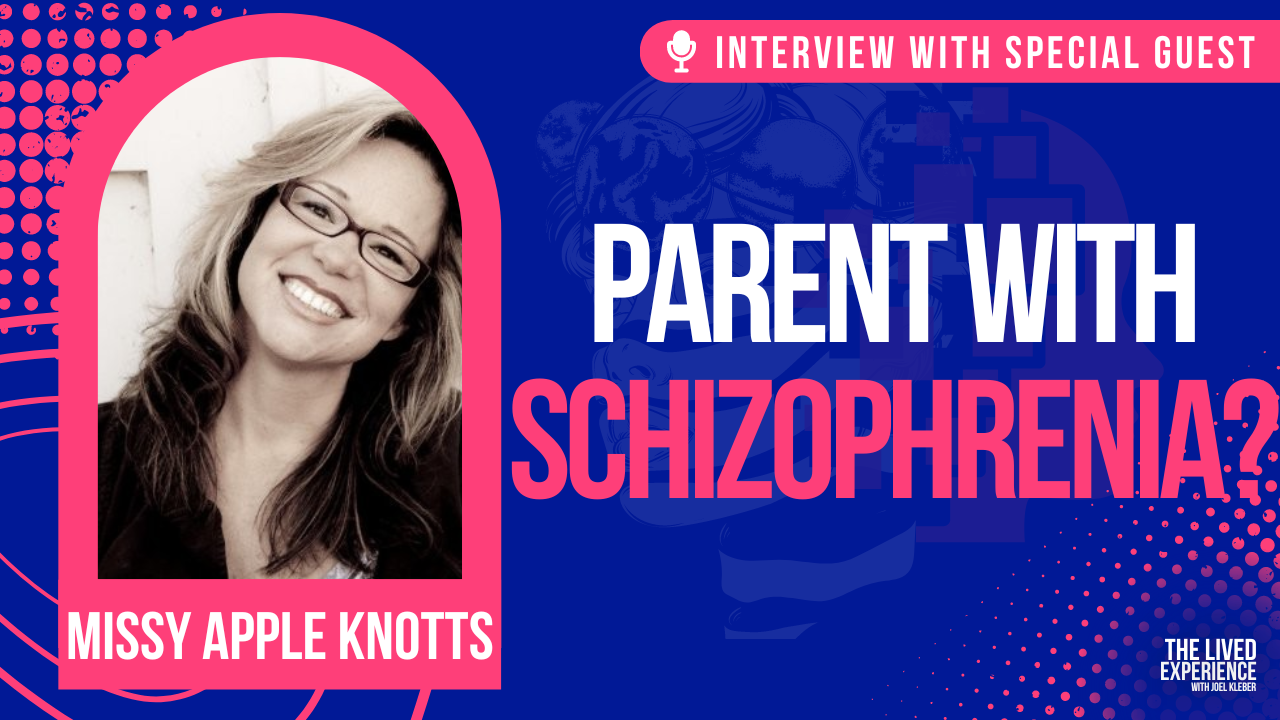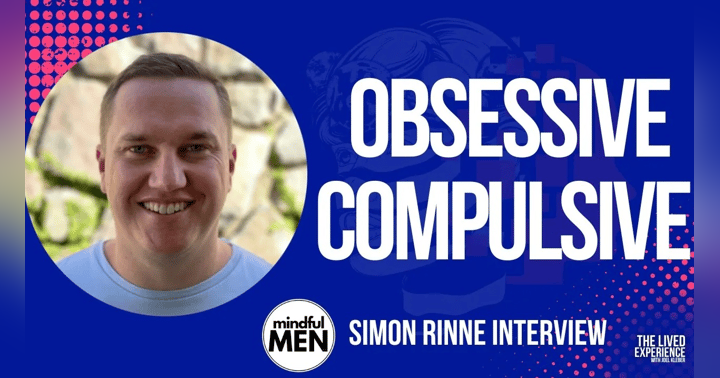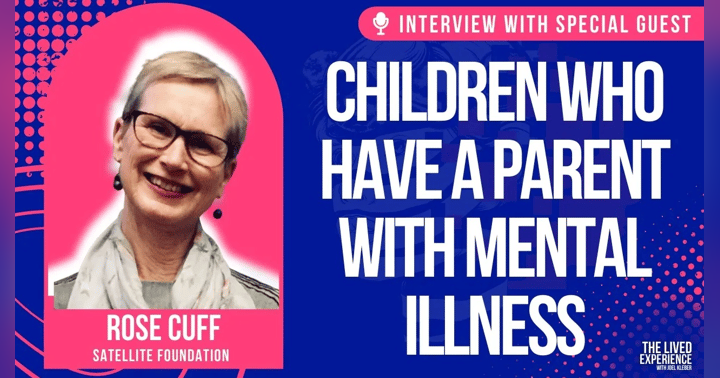Interview with Missy Apple Knotts about growing up with a parent who had Shizophrenia

JOEL: How did you and your mother cope in a household of ten children?
MISSY: Well, by the time I came along, she was well into struggling with her illness. My mom was way overmedicated and had shock treatments the whole all the things and she became very reliant on medication.
And she just said, ‘yes’ and took the medication, and it was supposed to help, and it wouldn't help. And then there's the side effects, and all the things and basically, she did the best that she could.
And I hear my older siblings talk about the mom before there was an event that was like a crash in her life. And prior to that, I think at that time when that happened, and I believe it was either the late 50s or early 60s, that happened for her.
But prior to that she was this great. I mean, very involved. She was a country western singer. And she would play the mandolin. And I have her guitar sitting right here next to me, as you play the harmonica, and she makes these great meals and made the kids clothes and bathe them, but that's a mom I never knew.
So, by the time I come along, she's in bed, that's 24/7. Basically, she was in bed, she would get up around four o'clock every day, maybe 4:35-40, you know, in there before my dad would get home, and she would try to put dinner together.
It was struggle. It was very hard. But I don't have any memories of her caring for me at all. So, it was it was tough.
Did your older siblings help you manage it all? Did they? Did they give you some advice?
No, nobody talks about it. And everybody was trying to figure out, I think, for a long time exactly what was wrong.
And then she had this diagnosis of schizophrenia. I never knew about it. In fact, I didn't know that was the exact diagnosis until I was a freshman in college.
And then I did my own research and figured out that's what it was. Later in mom's life, I helped her find another doctor. And they had her reevaluated. This was after I have three boys.
And this was after I had my liberal a little bit, took her back had her evaluated again and of course, it comes back as the same thing. But no, we didn't really talk about it.
Until later, we had a tragedy where one of my oldest nephews passed unexpectedly, his father is number one in the family. And he brought us all together through that grieving process that he had gone through grieving his son, and he was a counselor himself, that took what he would give back to people who are grieving to a whole another level through his own personal experience.
And when there was an incident where he brought us all together. And he said — we were sitting in a steak and shake in Indianapolis — and he said, “we've got to start talking, we've got to start talking, or it's going to eat us all up. We've got to share stories”.
And I remember I broke down sobbing, to my brother, Scott is number nine. I just collapsed in tears. And the others were all just like crying, but then that opened it up, and we each started sharing stories, of course, the top five have horrible guilt over leaving the boss five.
And they have said, “we thought it would get better and it didn't’.
And so, I've got still to this day, it's like one of my fears is being abandoned and being left that I must fight against. And because I would have a sibling that would care for me. And I'd become dependent.
Well, they would move, they would graduate high school, and they would leave, and then the next one, and then they leave.
So, that's super suck. So, it becomes but then, I learned early that, like, I had to take care of myself, and I did and there's some good and bad with that.
Were you told about it when you were child? Did you notice anything? Did you do a lot of research on it?
Yeah, that was basically I didn't know and so freshman in college, that's what she had. I knew that she wasn't right. In high school, I knew she had mental illness.
I didn't know exactly what it was back then, I think that I saw like schizophrenia was a multiple personality disorder. I think that's what was often be confused.
I have fond memories of her being gone when I was young much she would just not be there.
So, I didn't notice it as much. And she wasn't there because she was institutionalized. I guess she was in the mental hospital. And I didn't realize it because it's not like we had the day-to-day structure. She was always in bed; she was always back. And so, when she was gone, like it not a whole lot changed for me.
When you were younger, did you have to go to the mental hospital to visit?
I have one very, very vague memory of being there with her. And they would give them these crafts to do, and she would make — I remember her making this mosaic like a trivet that you put up a hot pot on.
And she also made a great big table that must have been when she was in there for much longer. But it was all these little mosaics that they would pile in.
And I have a very vague memory of that. But it's funny because whenever I see a mosaic trivet like that turns my stomach, I automatically like my body remembers. And I get just like, I can't even look at him.
And it's a trigger for me. But I don't think that I went very often. But I was pretty young. And when I got into, I think middle school high school.
I don't remember ever being in a hospital then she was home.
What about the treatments back then—were they first explained to you?
No, not at all that the big story from their family is like one I think it was the first time she had it done. And I wasn't even on this planet yet.
And she came home, and they lined all my siblings up. And she was trying to remember their names. And as the eldest who had cared, how there's these amazing stories of my older siblings, they basically had to take turns going to school, because they cared for all the others, and had to watch my mom and protect my mom and keep her in the house and all these things and but they tell the story of having to stand up there and being excited, like, ‘Come on mom, you can get it, you can get it’ and she would finally find the name.
So, that's the only real memory and it's through my siblings telling the story because I was not born yet. And so, I know, she had gone several times, I don't know how many times. I know her memory was very; she was very bright she was she was very smart.
But that took a toll on her.
And we had a very small home, we were very poor. And we had to the left of the kitchen sink, there was a cabinet on the second shelf, there must have been 20 or 30 different bottles with her name, and she would take handfuls every day.
And then I remember there was one was a liquid and that was the one that would just knock her out. So, when it was bad, and that brought on a lot of anxiety because she would often get up in the middle of the night and go and open that cabinet door to hear that creek and then you just like, ‘Oh no, here we go’.
And behold and she was doing what she thought first time sense of relief. So, it was hard.
Did the other families or the people at school know about your situation so they could help you?
No, not really and I was talking to my husband about some of these men. Marie's in the car earlier today, and I was thinking, I don't know how the school didn't do something at because you at a very young age there was nobody to do laundry.
So, I'm trying to find clothes and I'm like in kindergarten, maybe first grade, I'm trying to find clothing to wear. And there's nothing clean, and I'm having to pull clothes out of a dirty hamper that I should never have been wearing.
And I know or something that was way too small or something way too big for me. And I don't know, why this school, I suppose it was just a different time where you just didn't talk about it, especially mental illness.
Or perhaps, maybe they had contacted, and I just didn't know about it.
I don't know if there were ever any conversations, not to my knowledge. There was never anyone to come in, I have heard stories that there were some family members that wanted to split us up. And my dad wouldn't allow it.
He kept us all together.
And to this day, the 10 of us are so tight, we adore each other, we love each other, we protect each other. And we are each other's biggest advocates, they're the most generous, loving people on this planet.
And I've under as I get older; I understand that's not the norm in many families. But for the 10 of us, I think because of what we all survived together, we are just as tight as can be now.
What do you think would have helped you?
I think if there's someone in the school, if someone could have tagged me in the school, and brought me and maybe brought in, my dad never would have done it, my mom couldn't have done it.
So maybe a sibling or something and found out if I could have had maybe an after-school program or something at a YMCA or something that would brought me in and 101.
This is what your mom is going through, this is what your family members going through.
And then, and this is actually what I am working on something that I would love to do provide some to like after school services, provide some tutoring, provide a laundry service, like the sounds.
I don't know how this sounds, but I envision like a kid having a bag, you take it home, you put your laundry in it next day, you bring it with you, and maybe this is more suited for our YMCA, not a school setting, but we're going to teach you how to do laundry where they weren't and if you're really young, we're going to do the laundry for you. Or this is how to cook, and this is how to make a peanut butter and jelly sandwich just if I had to have that kind of like nutrition, support, laundry was a big deal.
Tutoring would have been amazing. Because there's, when you are as a child, you're under that much stress at home.
You can't think, to concentrate on schoolwork. Like it's a struggle.
And so, I think to understand what it is, and then just have those practical, like active activities of daily living, laundry, food, and then the tutoring that would have been a game changer.
I'd throw a mentor in there that just naturally evolved as we're doing these things together.
And I also something else I would throw in there is help identify what the kiddos are good at what's your strength. And you can do all kinds of creative things with that.
Let them help them identify what their talent is, or something they can feel positive about and grow and build confidence. For me it was music.
And I could sing, and I could run fast because I walked down that track team and I they put me right on varsity — of course I only did it one year was expensive.
We couldn't buy shoes, all that stuff. But they put me I was at the fastest person on the track team, and I walked in generic basketball shoes and outran everyone. And that was because I used to escape. I love horses.
And I used to pretend like I was riding a horse. And I would run for hours and hours and hours outside.
And just to escape what was inside the house. So yeah, so kind of yammering on a bit.
What do you think you've learned as a skill from your childhood?
I would say I'm an empathy, I have empathy for my sons, when son is very, very empathetic, but I can empathize with people, and I listen.
And I picked up as I've gotten old, like, I'm very sincere when I asked someone how are you doing? I really want to know it's not just a turn of race.
Oh, yeah, I'm great. How are you know, on the law, and that's one thing I'm very interested in people and being authentic.
That's one of my core values because I lived the other way for so long having to act one way when all this turmoil is going on. So being authentic is very important to me.
And I think I draw that out of people. I can read a room; I can read people and like subtle little changes in behavior. And that came from trying to navigate my dad trying to navigate my mom.
That would be my superpower, but it makes me great in my job because I can just tell like when somebody's got a certain what's important to them and what's not what's annoying, what's not.
I have great relationship with my boys, and they tell me sometimes too much, but it's I have an incredible bond with them where, like from a very young age because we never talked about how we felt about anything.
I was very purposeful with them when they're very young, something would happen, they'd hit their head, their hand or something. I'm like, ‘did that hurt’ helping them come out with? or ‘Are you mad?’ ‘Are you angry?’.
And they're fabulous communicators now.
And we're all very tight. And I think that came from being very purposeful of, we're going to talk about things, we're going to unpack things appropriately.
I am proud that my three guys are just, and they've got these great hearts, they're all very giving and caring.
And I would say, that's very true of my family as well. I think they're very empathetic, my siblings were very empathetic, very generous people. Having gone through some tough times. Those are just a couple of things that come to mind the great question.
Big thanks to Missy for sharing her story and you can as well via the contact form on this site.










